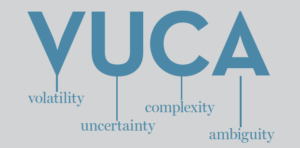By Whitney Weeks, BA'94

“Getting people to nod their heads isn’t the same thing as getting them to move their feet. With this type of tailored coursework, we achieve both,” says Professor Ranga Ramanujam about the Owen School’s VUCA focused executive education programs.
Vanderbilt Owen’s Executive Education programs are stepping in to help, developing custom courses for global companies such as Alba, Bridgestone and Nissan that offer strategies for uncertain times. Led by professors like Ranga Ramanujam, Dick Daft and Joe Ryan, the courses explore the concept of a VUCA—Volatility, Uncertainty, Complexity, Ambiguity—world and teach the skills needed to operate successfully within it. Managing change used to mean preparing for a new strategic plan, a leadership transition, a new product launch or an acquisition. For many businesses today, that level of predictable change is as novel as using a fax machine. Change has become constant, and companies that do best in this new environment have adapted their executive education offerings accordingly. During the past several years, VUCA has caught the imagination of the corporate world, and Vanderbilt’s Executive Education programs are responding to that interest. “The concept of VUCA first came up in the U.S. military to describe the world after the Cold War. New countries were popping up every day, new alliances were being formed, and it wasn’t clear who was an ally or who was not,” says Ranga Ramanujam, professor of management and the Richard M. and Betty Ruth Miller Professor of Healthcare Management. Vanderbilt tailors VUCA-focused executive education programs by beginning with a very clear intentionality in what they do and do not emphasize. These are not programs to assist with structural or strategic changes at an organizational level. Instead, these courses teach participants personal and organizational effectiveness in a VUCA world, with particular emphasis on skills like building social networks, leading change, receiving feedback and evidence-based management. Foundational to these tailored offerings is a focus on developing a growth versus a fixed mindset. Feedback received by Executive Education faculty underscores the value that organizations receive from customized programming that showcases best practices as well as the tools to achieve them. “Getting people to nod their heads isn’t the same thing as getting them to move their feet,” Ramanujam says. “With this type of tailored coursework, we achieve both.” The programs offered by the Executive Education faculty are specific to the needs and concerns of their clients. With succeeding in a VUCA world as a focus, certain fundamental principles should be addressed:
• Work beyond what you are asked to do. In this day and age, no one ever should expect to receive a truly complete job description. Managers and executives must learn to self identify those critical aspects of their roles that never will be formally articulated, then execute them with excellence.
• Managers matter. Employing data-driven, specific behaviors for effective team management guarantees teams perform better and boast higher retention and greater job satisfaction. Google’s Project Oxygen and its eight top behaviors for managers are commonly held as a good place to start. HR managers around the world, though, are approaching effective management in a data-driven way specific to their own organizations.

• Vertical training yields results. Increasingly, organizations provide tailored executive education professional development and training to their executive teams and senior managers, as well as to middle managers and front-line managers. Feedback received from companies after these vertical trainings confirmed that the investment was worth it to the organization. “Often this is a chance for very busy managers to gain exposure to new ideas and have meaningful conversations focused on action,” says Ramanujam. Providing training beyond executives and top-performing managers sets a tone that a company expects and values the involvement of all employees in a VUCA world. And, says Ramanujam, there is something incredibly powerful in having a CEO introduce a day of training to front-line managers by saying he’s gone through and learned from the training, too.
• Learn to seek and receive feedback. In an environment of constant change and inadequately defined roles and expectations, receiving feedback is critical to improving performance. Because feedback isn’t readily available, one must be willing to seek it out from colleagues, clients and supervisors—but with the understanding that few organizations or managers are particularly skilled or effective at providing it. Rather than focusing on how to give good feedback, the onus is placed on the receiver. A favorite book of Ramanujam’s is Thanks for the Feedback: The Science and Art of Receiving Feedback Well (Even When It Is Off Base, Unfair, Poorly Delivered and, Frankly, You’re Not in the Mood) by Douglas Stone and Sheila Heen.
• Growth mindsets are the only option. The difference between a growth mindset and a fixed mindset is the difference between succeeding and failing in a VUCA world. Individuals who are trained in growth mindset methods are far better equipped to cope personally and internally with change facing their organizations and their teams. This, in turn, affords them the confidence and security required to lead through ever uncertain times.
Whitney Weeks is founder and principal of Whitney Works, a national boutique consulting firm. Formerly, she was an executive at both the Nashville Area Chamber of Commerce and the Vanderbilt Center for Nashville Studies.